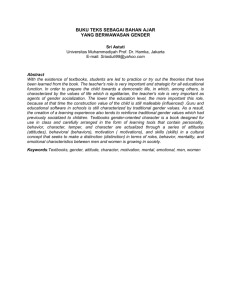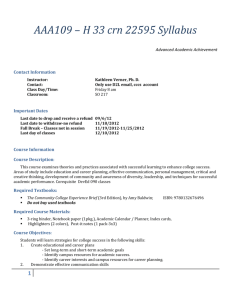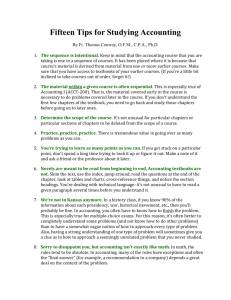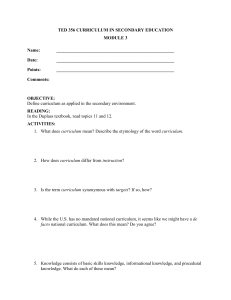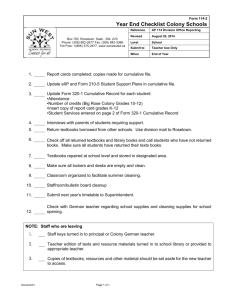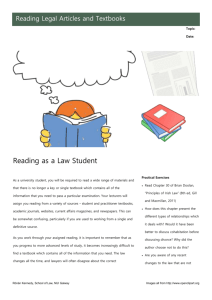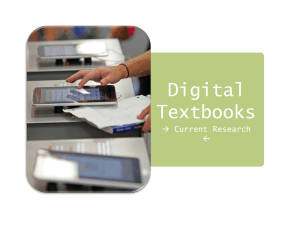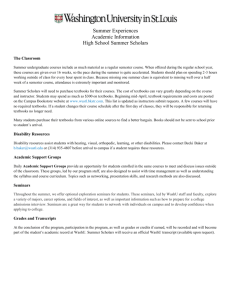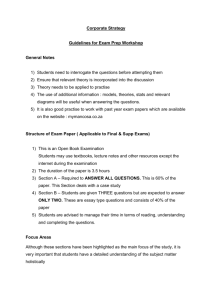Report - WordPress.com
advertisement
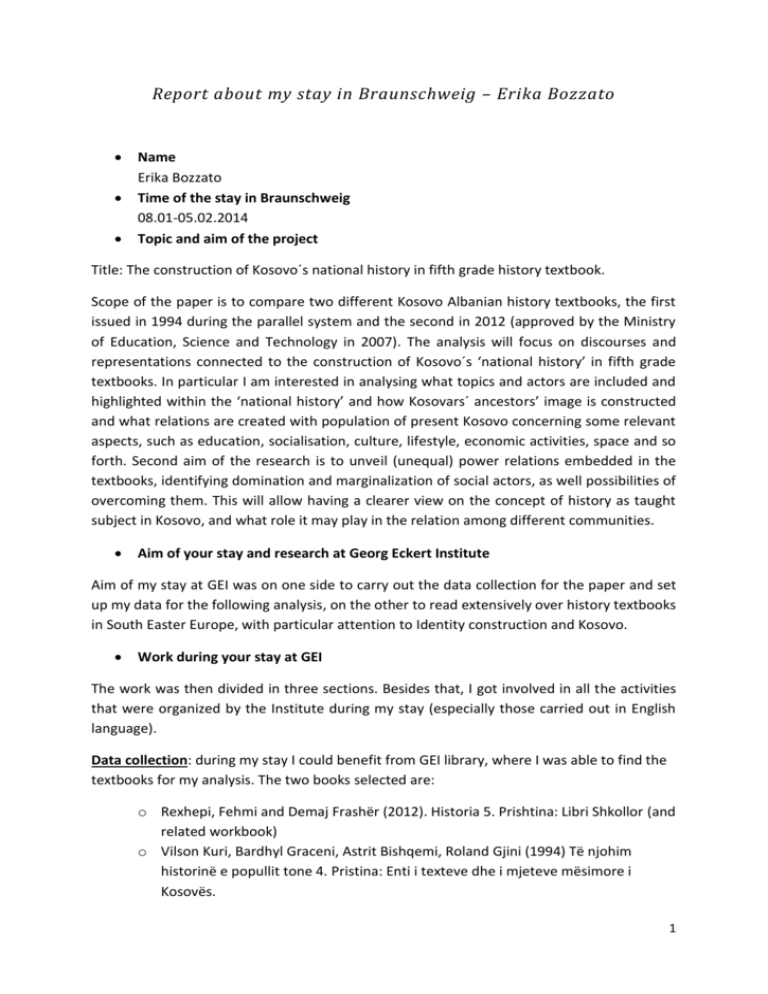
Report about my stay in Braunschweig – Erika Bozzato Name Erika Bozzato Time of the stay in Braunschweig 08.01-05.02.2014 Topic and aim of the project Title: The construction of Kosovo´s national history in fifth grade history textbook. Scope of the paper is to compare two different Kosovo Albanian history textbooks, the first issued in 1994 during the parallel system and the second in 2012 (approved by the Ministry of Education, Science and Technology in 2007). The analysis will focus on discourses and representations connected to the construction of Kosovo´s ‘national history’ in fifth grade textbooks. In particular I am interested in analysing what topics and actors are included and highlighted within the ‘national history’ and how Kosovars´ ancestors’ image is constructed and what relations are created with population of present Kosovo concerning some relevant aspects, such as education, socialisation, culture, lifestyle, economic activities, space and so forth. Second aim of the research is to unveil (unequal) power relations embedded in the textbooks, identifying domination and marginalization of social actors, as well possibilities of overcoming them. This will allow having a clearer view on the concept of history as taught subject in Kosovo, and what role it may play in the relation among different communities. Aim of your stay and research at Georg Eckert Institute Aim of my stay at GEI was on one side to carry out the data collection for the paper and set up my data for the following analysis, on the other to read extensively over history textbooks in South Easter Europe, with particular attention to Identity construction and Kosovo. Work during your stay at GEI The work was then divided in three sections. Besides that, I got involved in all the activities that were organized by the Institute during my stay (especially those carried out in English language). Data collection: during my stay I could benefit from GEI library, where I was able to find the textbooks for my analysis. The two books selected are: o Rexhepi, Fehmi and Demaj Frashër (2012). Historia 5. Prishtina: Libri Shkollor (and related workbook) o Vilson Kuri, Bardhyl Graceni, Astrit Bishqemi, Roland Gjini (1994) Të njohim historinë e popullit tone 4. Pristina: Enti i texteve dhe i mjeteve mësimore i Kosovës. 1 Set up of data analysis: The analysis is being carried out following Fairclough´s Dialectical Relational Approach version of Critical Discourse Analysis (CDA). CDA is especially interested in social analysis of the discourse, which is complex and therefore requires a multi-disciplinary and multimethodical approach, and allows analysis of long-term social transformation. Texts are being analysed from different points of view, considering linguistic and extra-linguistic features. They will be considered in fact as semiotic element of broader social practices and their role within these is going to be determined through analysis. This methodology will allow embedding the textbook analysis in a broad context. Images and layout of the textbooks will be equally part of the analysis, and complete it. Literature review: GEI library was especially useful during the first phase of the paper drafting, as it include a lot of volumes specialized on the topic. Aleksić, T. (2007). Mythistory and narratives of the nation in the Balkans, Newcastle: Cambridge Scholars, 2007. Bideleux, R. (2007). The Balkans: a post-communist history, London: Routledge. Couroucli, M. (1997). The Balkans - ethnic and cultural crossroads: educational and cultural aspects, Sofia (Bulgaria), 27 - 30 May 1995; democracy, human rights, minorities: educational and cultural aspects, Strasbourg: Council of Europe Publ. Danova, N., School textbooks and national stereotypes in the Balkans in the nineteenth century. Dogo, M. (2002). Disrupting and reshaping: early stages of nation-building in the Balkans, Ravenna: Longo. Duka, V. (2006). Regional history in textbooks: the Albanian case. In: In search of a common regional history: the Balkans and the East Asia in history textbooks (2006), pp. 43-50. Koulouri, C. (2002). Clio in the Balkans: the politics of history education, Thessaloniki: Center for Democracy and Reconciliation in Southeast Europe. Lenkova, M. (1998). "Hate speech"·in the Balkans, Athens: ETEPE. Pavlowitch, S. (2000). A history of the Balkans, 1804 – 1945, London: Longman. Roudometof, V. (2001). Nationalism, globalization, and orthodoxy: the social origins of ethnic conflict in the Balkans, Westport, Conn: Greenwood Press. Segesten, A. (2008). History textbooks in the Balkans: representations and conflict. In: The poetics of memory in post-totalitarian narration (2008), pp.139-153 Simoska, E., General problems in the history textbooks of the Balkans. Todorova, M. N. (1997). Imagining the Balkans, New York: Oxford Univ. Press. The Balkans : traditional patterns of life, Wien : Verein für Geschichte und Sozialkunde, 1999. Besides that, I could consult papers in various journals, such as Südost-Europa, Curriculu series and so on. Other activities: attendance of GEI colloquium and Stammtisch, partial attendance of Cost Workshop. 2 Preliminary results During my stay at GEI I worked on the following paragraphs (Paragraphs´ titles are not definitive): Education in post-conflict context – focus on the Balkans The paragraph focuses on the concept of the two faces of education, and on how crucial it is the analysis of education in the context of identity-based conflicts. History textbooks in the Western Balkans and the construction of national history This part tackles the issue of history textbooks in the Western Balkans and in Kosovo, delineating some common features and some main issues, such as their nationbuilding project through (history) education, the representation of ‘self’ and ‘other’, the description of wars and conflict and so forth. History teaching and history textbooks in Kosovo since the 1970s The section analyses the development of the (history) curriculum in Albanian language since the 1970s, especially referring to the constitutional reforms in the 1970s, the parallel system in the 1990s and the actions undertaken after the conflict in 1999, by UNMIK and then Kosovo Ministry of Education, Science and Technology. Some space is also given to teaching methodologies. The construction of Kosovar identity The paragraphs include two parts. The first part tackles the general nationhood issues in former Yugoslavia, with particular attention to the restrain of the political nationalism during Communism and the rise of post-Communism nationalism and how these two elements may be connected. The second part focuses on Kosovo, digging on the articulation of the Albanian nationhood from the 1970s on, focusing in particular on the parallel system. Critical Discourse Analysis and power relations – theoretical background and methodology of analysis This section focuses on the benefits that CDA can offer in such an analysis, as it can provide a good insight on processes and factors involved in social transformations. The analysis starts with the analysis of the context of textbooks productions and goes then to the linguistic and visual aspects of the textbooks. Data 3 The paragraph describes in details the two textbooks object of analysis, especially focusing on the historical and political circumstances from which they derive and on their authors Results At the moment, the external appearance of the two books has been described, their structures and part of the visual content. Scheduled progress of the work The full paper will be sent by 30th June for the anthology of the GEI conference on textbooks in Albanian language (held in Pristina in November 2013). Remarks of your stay in Braunschweig I found GEI library an optimal place to carry out my research work, also combined with the accommodation in the guest-house, which allows intensive and smooth working days. I only wished GEI staff was closer to the library, in order to be able to discuss and exchange ideas more frequently. 4
